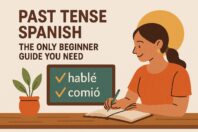Spanish Grammar: Preguntar vs Pedir vs Ordenar

Get our free email course, Shortcut to Conversational.
Have conversations faster, understand people when they speak fast, and other tested tips to learn faster.
More infoAs a Spanish student, you’ll come across certain verbs that when translated directly, look like they have the same meaning, but in reality, each verb has a specific use. A good example of this is Preguntar vs Pedir vs Ordenar, which we’ll explain in this post.
Let’s look at the exact translations for each one:
- Preguntar (To ask)
- Pedir (To ask, ask for, request)
- Ordenar (To order, to sort, to command)
It’s easy to see how these verbs sometimes cause confusion for English speakers, at least in the case of Pedir and Preguntar, which are used in a similar way.
Below are some examples of all three verbs being used in a different way when ordering food, asking for information, and even giving orders.
- I’m going to order pizza – Voy a pedir pizza
- I already ordered the documents – Ya ordené los documentos
- Ask what time it is – Pregunta qué hora es
- The judge ordered the suspect to be captured- El juez ordenó la captura del sospechoso
In this post, we’ll clarify exactly how Spanish verb is used, depending on what you wish to express.
How To Use Preguntar
Among the three verbs we’re going to explain, preguntar is probably the easiest to understand, since it always has the same purpose: to ask questions or inquire about something (or someone).
The English equivalent of the verb preguntar is to ask or to wonder.
We use the verb preguntar when we want to find out a piece of information, whether it’s asking about a price, a person’s age, schedules, time, names, addresses, etc.
Let’s see how to conjugate it in the most common Spanish tenses.
| Personal pronoun | Present | Simple Past | Future | Imperfect Past Tense |
| Yo | Pregunto
– I ask |
Pregunté
– I asked |
Preguntaré
– I will ask |
Preguntaba
– I used to ask |
| Tú | Preguntas
– You ask |
Preguntaste
– You asked |
Preguntarás
– You will ask |
Preguntabas
– You used to ask |
| Él – Ella | Pregunta
– He/She asks |
Preguntó
– He/She asked |
Preguntará
– He/She will ask |
Preguntaba
– He/She used to ask |
| Usted | Pregunta
– You ask |
Preguntó
– You asked |
Preguntará
– You will ask |
Preguntaba
– You used to ask |
| Nosotros | Preguntamos
– We ask |
Preguntamos
– We asked |
Preguntaremos
– We will ask |
Preguntábamos
– We used to ask |
| Ustedes | Preguntan
– You ask |
Preguntaron
– You asked |
Preguntarán
– You will ask |
Preguntaban
– You used to ask |
| Ellos | Preguntan
– They ask |
Preguntaron
– They asked |
Preguntarán
– The will ask |
Preguntaban
– They used to ask |
And now, some examples of preguntar being used in full sentences.
- Can you ask what the next available flight is? – ¿Puedes preguntar cuál es el próximo vuelo disponible?
- They asked me a lot of things in the job interview – Ellos me preguntaron muchas cosas en la entrevista de trabajo
- I wonder where the children will be now – Yo me pregunto dónde estarán ahora los niños
- A lady in the market asked me if I could help her with her bags – Una señora en el mercado me preguntó si podía ayudarla con sus bolsas
- I’m going to ask how much that dress costs – Voy a preguntar cuánto cuesta ese vestido
- They asked at the reception desk if there were rooms available – Ellos preguntaron en recepción si habían habitaciones disponibles
- Stop the car to ask where the hotel is – Detén el auto para preguntar donde queda el hotel
- Tomorrow you will ask your teacher when the exam will be – Mañana le preguntarás a tu profesor cuando será el exámen
How To Use Pedir
The verb pedir is used when we want to ask, request, or order something in particular.
It’s important to reiterate that pedir isn’t used to ask questions about ideas or concepts. For that, you use preguntar.
Back to pedir, we use this verb when asking for something in a restaurant, or for favors or when you need someone to do something for you – not as command, but more as a request.
- Just order the burger without cheese – Solo pide la hamburguesa sin queso
- Can I ask you for a favour? – ¿Puedo pedirte un favor?
Now, let’s review how to conjugate pedir in the major Spanish tenses.
| Personal pronoun | Present | Simple Past | Future | Imperfect Past Tense |
| Yo | Pido
– I ask for |
Pedí
– I asked for |
Pediré
– I will ask for |
Pedía
– I used to ask for |
| Tú | Pides
– You ask for |
Pediste
– You asked for |
Pedirás
– You will ask for |
Pedías
– You used to ask for |
| Él – Ella | Pide
– He/She asks for |
Pidió
– He/She asked for |
Pedirá
– He/She will ask for |
Pedía
– He/She used to ask for |
| Usted | Pide
– You ask for |
Pidió
– You asked for |
Pedirá
– You will ask for |
Pedía
– You used to ask for |
| Nosotros | Pedimos
– We ask for |
Pedimos
– We asked for |
Pediremos
– We will ask for |
Pedíamos
– We used to ask for |
| Ustedes | Piden
– You ask for |
Pidieron
– You asked for |
Pedirán
– You will ask for |
Pedían
– You used to ask for |
| Ellos | Piden
– The ask for |
Pidieron
– They asked for |
Pedirán
– They will ask for |
Pedían
– They used to ask for |
Below are the most common scenarios for using pedir.
1) For ordering food
- I would like to order the pasta with vegetables – Quisiera pedir la pasta con vegetales
- I don’t want to cook, better to order Chinese food – No quiero cocinar, mejor vamos a pedir comida china
- Why don’t you ask for the wine menu? – ¿Por qué no pides el menú de vinos?
- You should ask for the lemon pie – Deberías pedir el pie de limón
2) To request something
- We asked for a room with an ocean view, and the one they gave us is not like that – Nosotros pedimos una habitación con vista al mar, y la que nos dieron no es así.
- I’m going to ask for a discount – Voy a pedir un descuento
- Let’s ask the taxi to come earlier – Vamos a pedirle al taxi que venga más temprano
- They are already asking for all the information – Ellos ya están pidiendo toda la información
3) To request favors
- Guys, please, can I ask you to be quiet? – Chicos, por favor, ¿puedo pedirles un poco de silencio?
- I ask you never to lie to me – Te pido que nunca me mientas
- Ask your sister to help you with homework – Pídele a tu hermana que te ayude con la tarea
- He asked me to accompany him to the airport – Él me pidió que lo acompañara al aeropuerto
How To Use Ordendar
And finally, we come to the verb ordenar, which can mean “to order“, “to sort out” and also “to command”, but it’s typically used to order food.
Now, let’s see how to conjugate ordenar in some of the major Spanish tenses.
| Personal pronoun | Present | Simple Past | Future | Imperfect Past Tense |
| Yo | Ordeno
– I order |
Ordené
– I ordered |
Ordenaré
– I will order |
Ordenaba
– I used to order |
| Tú | Ordenas
– You order |
Ordenaste
– You ordered |
Ordenarás
– You will order |
Ordenabas
– You used to order |
| Él – Ella | Ordena
– He/She orders |
Ordenó
– He/She ordered |
Ordenará
– He/She will order |
Ordenaba
– He/She used to order |
| Usted | Ordena
– You order |
Ordenó
– You ordered |
Ordenará
– You will order |
Ordenaba
– You used to order |
| Nosotros | Ordenamos
– We order |
Ordenamos
– We ordered |
Ordenaremos
– We will order |
Ordenábamos
– We used to order |
| Ustedes | Ordenan
– You order |
Ordenaron
– You ordered |
Ordenarán
– You will order |
Ordenaban
– You used to order |
| Ellos | Ordenan
– They order |
Ordenaron
– They ordered |
Ordenarán
– They will order |
Ordenaban
– They used to order |
And now, some examples of how to use ordendar in various scenarios.
1) Ordering food
- I’d like to order the cheese-edge pizza – Quisiera ordenar la pizza con borde de queso
- Tell the waiter that we are ready to order – Dile al mesero que estamos listos para ordenar
- What would you like to order for dessert? – ¿Que les gustaría ordenar de postre?
- We are going to order the paella for 4 people – Vamos a ordenar la paella para 4 personas
2) To put something in order or sort out
- You have to sort the list in alphabetical order – Tienes que ordenar la lista por orden alfabético
- You will not leave until you sort out your room – No vas a salir hasta que ordenes tu habitación
- The students did not order the classroom before leaving – Los alumnos no ordenaron el salón de clase antes de irse
- I like to order/sort my clothes by color – Me gusta ordenar mi ropa por color
3) To order as a command
- The director of the school ordered to change the schedule class – El director de la escuela ordenó el cambio de horario de las clases
- The general ordered the soldiers to go to battle – El general le ordenó a los soldados que fueran a la batalla
- The dog understands all the orders I give him – El perro entiende todas las órdenes que le doy
- You have to pay attention to the orders given to you – Tienen que prestar atención a las órdenes que se les da
Pedir vs Preguntar vs Ordenar: Exercises
Choose between ordenar, preguntar o pedir as needed
1. Quiero ______ comida italiana
(I want to order Italian food)
2. Tenemos que ______ la casa antes de que llegue mi mamá
(We have to put in order the house before my mom arrives)
3. ¿Puedes ______ si tienen torta de chocolate?
(Can you ask if they have chocolate cake?)
4. ______ al camarero que traiga agua
(Ask the waiter to bring water)
5. ¿Puedo ______ algo?
(Can I ask something?)
6. Tienes que aprender a ______ ayuda
(You have to learn to ask for help)
7. El profesor le ______ a los alumnos que hicieran silencio
(The teacher ordered the students to be quiet)
8. El profesor le ______ a los alumnos que dejaran todo limpio
(The teacher asked the students to leave everything clean)
9. Me han ______ muchas cosas en el aeropuerto
(I’ve been asked a lot of things at the airport)
10. Ella seguro ______ el helado más grande
(She will surely order the biggest ice cream)
Answers
1. Quiero ordenar comida italiana
2. Tenemos que ordenar la casa antes de que llegue mi mamá
3. ¿Puedes preguntar si tienen torta de chocolate?
4. Pídele al camarero que traiga agua
5. ¿Puedo preguntar algo?
6. Tienes que aprender a pedir ayuda
7. El profesor le ordenó a los alumnos que hicieran silencio
8. El profesor le pidió a los alumnos que dejaran todo limpio
9. Me han preguntado muchas cosas en el aeropuerto
10. Ella seguro ordenará el helado más grande


